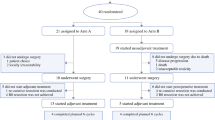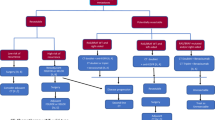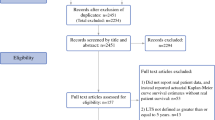Abstract
Pancreatic neuroendocrine tumors (PanNETs) account for approximately 2% of all pancreatic malignancies. Several systemic treatment options have been developed over the last four decades, ranging from cytotoxic chemotherapy and octreotide to newer targeted therapies like sunitinib, cabozantinib, and lenvatinib. Although surgery or liver-directed therapy remains cornerstone for management of metastatic PanNETs, however, they remain unfeasible in majority of cases. PanNETs behave differently than SI-NETs (small intestinal NET); the former is more aggressive and less responsive to somatostatin-based therapies. The optimal sequence of the systemic therapies for the advanced PanNETs depends mainly on the tumor burden, Ki-67 index, and the tempo of the disease. In the end, drawing from ENETS (European Neuroendocrine Tumor Society) and ESMO (European Society for Medical Oncology) guidelines, we propose a working algorithm for the management of advanced PanNETs, not amenable to surgery or liver-directed therapies.


Similar content being viewed by others
References
Couvelard A, Cazes A, Cros J (2023) Updates in histopathological classification and tissue biomarkers of digestive neuroendocrine neoplasms: what the clinician should know. Best Pract Res Clin Endocrinol Metab 37:101795
Herr RR, Eble TE, Bergy ME, Jahnke HK (1959) Isolation and characterization of streptozotocin. Antibiot Annu 7:236–240
Hijioka S et al (2019) Clinical and in vitro studies of the correlation between MGMT and the effect of streptozocin in pancreatic NET. Cancer Chemother Pharmacol 83:43–52
Moertel CG, Hanley JA, Johnson LA (1980) Streptozocin alone compared with streptozocin plus fluorouracil in the treatment of advanced islet-cell carcinoma. N Engl J Med 303:1189–1194
Capdevila J et al (2022) Streptozotocin, 1982–2022: Forty years from the FDA’s approval to treat pancreatic neuroendocrine tumors. Neuroendocrinology 112:1155–1167
Moertel CG, Lefkopoulo M, Lipsitz S, Hahn RG, Klaassen D (1992) Streptozocin-doxorubicin, streptozocin-fluorouracil or chlorozotocin in the treatment of advanced islet-cell carcinoma. N Engl J Med 326:519–523
ClewemarAntonodimitrakis P et al (2016) Streptozocin and 5-fluorouracil for the treatment of pancreatic neuroendocrine tumors: efficacy, prognostic factors and toxicity. Neuroendocrinology 103:345–353
Kouvaraki MA et al (2004) Fluorouracil, doxorubicin, and streptozocin in the treatment of patients with locally advanced and metastatic pancreatic endocrine carcinomas. J Clin Oncol 22:4710–4719
Turner NC et al (2010) Chemotherapy with 5-fluorouracil, cisplatin and streptozocin for neuroendocrine tumours. Br J Cancer 102:1106–1112
De Mestier L et al (2019) Comparison of temozolomide-capecitabine to 5-fluorouracile-dacarbazine in 247 patients with advanced digestive neuroendocrine tumors using propensity score analyses. Neuroendocrinology 108:343–353
Kulke MH et al (2006) Phase II study of temozolomide and thalidomide in patients with metastatic neuroendocrine tumors. J Clin Oncol 24:401–406
Chan JA et al (2012) Prospective study of bevacizumab plus temozolomide in patients with advanced neuroendocrine tumors. J Clin Oncol 30:2963–2968
Strosberg JR et al (2011) First-line chemotherapy with capecitabine and temozolomide in patients with metastatic pancreatic endocrine carcinomas. Cancer 117:268–275
Kunz PL et al (2023) Randomized study of temozolomide or temozolomide and capecitabine in patients with advanced pancreatic neuroendocrine tumors (ECOG-ACRIN E2211). J Clin Oncol 41:1359–1369
Girot P et al (2022) Oxaliplatin and 5-fluorouracil in advanced well-differentiated digestive neuroendocrine tumors: a multicenter national retrospective study from the french group of endocrine tumors. Neuroendocrinology 112:537–546
Kunz PL et al (2016) Oxaliplatin-fluoropyrimidine chemotherapy plus bevacizumab in advanced neuroendocrine tumors. Pancreas 45:1394–1400
Al-Toubah T, Morse B, Pelle E, Strosberg J (2021) Efficacy of FOLFOX in patients with aggressive pancreatic neuroendocrine tumors after prior capecitabine/temozolomide. Oncologist 26:115–119
Sorbye H et al (2013) Predictive and prognostic factors for treatment and survival in 305 patients with advanced gastrointestinal neuroendocrine carcinoma (WHO G3): the NORDIC NEC study. Ann Oncol 24:152–160
Yao JC et al (2010) Daily oral everolimus activity in patients with metastatic pancreatic neuroendocrine tumors after failure of cytotoxic chemotherapy: a phase II trial. J Clin Oncol 28:69–76
Yao JC et al (2011) Everolimus for advanced pancreatic neuroendocrine tumors. N Engl J Med 364:514–523
Raymond E et al (2011) Sunitinib malate for the treatment of pancreatic neuroendocrine tumors. N Engl J Med 364:501–514
Capdevila J et al (2021) Lenvatinib in patients with advanced grade 1/2 pancreatic and gastrointestinal neuroendocrine tumors: results of the phase II TALENT trial (GETNE1509). J Clin Oncol 39:2304–2312
Testing cabozantinib in patients with advanced pancreatic neuroendocrine and carcinoid tumors - Tabular View - ClinicalTrials.gov. https://classic.clinicaltrials.gov/ct2/show/record/NCT03375320. Accessed 25 Jan 2024
Salazar R et al (2022) LBA45 Randomized open label phase III study comparing the efficacy and safety of everolimus followed by chemotherapy (CT) with streptozotocin (STZ)-5FU upon progression or the reverse sequence, in advanced progressive panNETs: the SEQTOR study (GETNE 1206). Ann Oncol 33(7):S1412. https://doi.org/10.1016/j.annonc.2022.08.044
Grande E (2016) Sequential treatment in disseminated well- and intermediate-differentiated pancreatic neuroendocrine tumors: common sense or low rationale? World J Clin Oncol 7:149
Scarpa A et al (2017) Whole-genome landscape of pancreatic neuroendocrine tumours. Nature 543:65–71
Albertelli M et al (2021) Present and future of immunotherapy in neuroendocrine tumors. Rev Endocr Metab Disord 22(3):615–636
Caplin ME et al (2014) Lanreotide in metastatic enteropancreatic neuroendocrine tumors. N Engl J Med 371:224–233
Wolin EM et al (2015) Phase III study of pasireotide long-acting release in patients with metastatic neuroendocrine tumors and carcinoid symptoms refractory to available somatostatin analogues. Drug Des Devel Ther 9:5075–5086
Pavel M et al (2018) Telotristat ethyl in carcinoid syndrome: safety and efficacy in the TELECAST phase 3 trial. Endocr Relat Cancer 25:309–322
Pavel ME et al (2019) Efficacy of everolimus plus octreotide LAR in patients with advanced neuroendocrine tumor and carcinoid syndrome: final overall survival from the randomized, placebo-controlled phase 3 RADIANT-2 study. Ann Oncol 30:2010
Strosberg JR et al (2019) Pembrolizumab treatment of advanced neuroendocrine tumors: results from the phase II KEYNOTE-158 study. J Clin Oncol 37(4):190 https://doi.org/10.1200/JCO.2019.37.4_suppl.190
Baudin E et al (2022) NEUROENDOCRINE TUMOURS 887O First multicentric randomized phase II trial investigating the antitumor efficacy of peptide receptor radionucleide therapy with 177 lutetium-octreotate (OCLU) in unresectable progressive neuroendocrine pancreatic tumor: results of the OCLURANDOM trial. Ann Oncol 33(7):S954. https://doi.org/10.1016/j.annonc.2022.07.1013
Halfdanarson TR et al (2022) Pivotal phase III COMPOSE trial will compare 177Lu-edotreotide with best standard of care for well-differentiated aggressive grade 2 and grade 3 gastroenteropancreatic neuroendocrine tumors. 40:TPS514–TPS514. J Clin Oncol 40(4):S514. https://doi.org/10.1200/JCO.2022.40.4_suppl.TPS514
Efficacy and safety of 177Lu-edotreotide PRRT in GEP-NET Patients - Full Text View - ClinicalTrials.gov. https://classic.clinicaltrials.gov/ct2/show/NCT03049189. Accessed 25 Jan 2024
Author information
Authors and Affiliations
Corresponding author
Ethics declarations
Conflict of Interest
The authors declare no competing interests.
Additional information
Publisher's Note
Springer Nature remains neutral with regard to jurisdictional claims in published maps and institutional affiliations.
Rights and permissions
Springer Nature or its licensor (e.g. a society or other partner) holds exclusive rights to this article under a publishing agreement with the author(s) or other rightsholder(s); author self-archiving of the accepted manuscript version of this article is solely governed by the terms of such publishing agreement and applicable law.
About this article
Cite this article
Lavingia, V., Gohel, S. & Sirohi, B. Systemic Therapy for Pancreatic Neuroendocrine Tumors. Indian J Surg Oncol (2024). https://doi.org/10.1007/s13193-024-01908-y
Received:
Accepted:
Published:
DOI: https://doi.org/10.1007/s13193-024-01908-y




